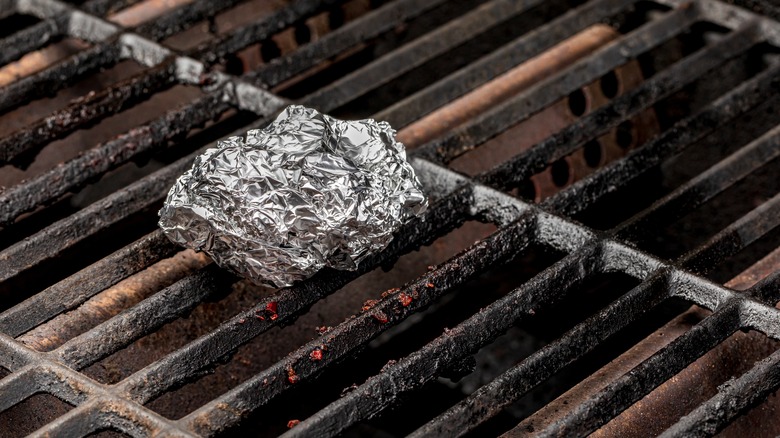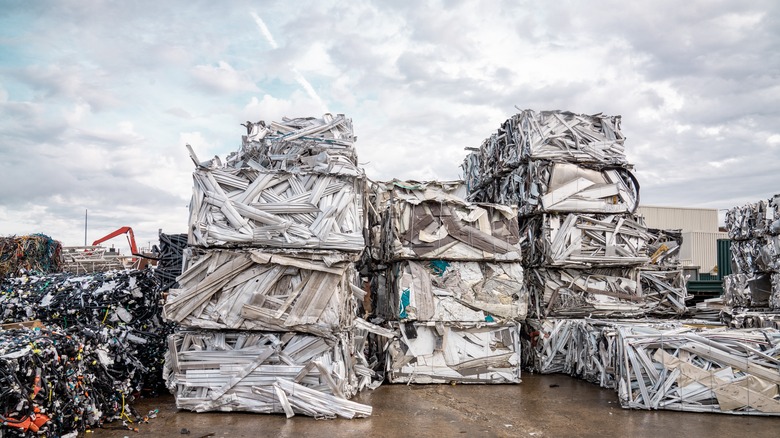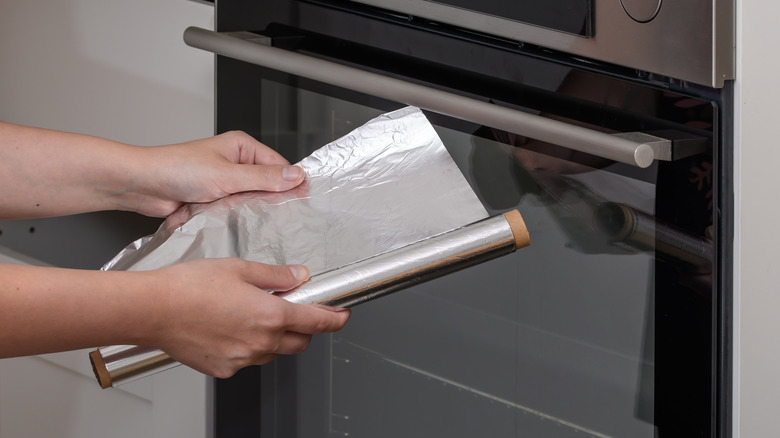Is It Actually Smart To Use Aluminum Foil On The Grill?
If you thought aluminum foil was just for covering casseroles and keeping the alien mind-readers at bay, you're missing out on a whole universe of uses that seems to have infiltrated every industry, hobby, and room of the house. Aluminum foil does everything from making a passable stand-in for a caulking gun to keeping electronics cool. Some favorite uses include using it to contain food that's being grilled and grabbing a ball of foil with some tongs to give your grill a good cleaning. But lately we've been seeing some objections that contaminated foil can't be recycled, and that there might be some health concerns associated with using it. The latter isn't anything to be concerned about, but the former is a very real problem. It doesn't mean you can't still spiff up your grill with foil — only that you need to be smart about it.
These concerns about recycling and health transcend grill-cleaning, of course. Any time something comes into contact with your food, you should be confident in its safety. And any use at all for aluminum foil should take into account the challenges of recycling the stuff. Sometimes it's not the greatest choice anyway — there are definitely uses for aluminum foil that are best avoided. But often there's no harm at all in using it with your grill, whether to cover your food or keep your appliance clean.
Contaminated foil often isn't recycled
Aluminum is 100% recyclable, and while very pure, non-recycled aluminum is required for some uses, even highly contaminated foil can be heat-processed to remove pollutants. The trouble is that many facilities simply won't bother with it because it's not cost-effective. It must ship relatively lightweight bits of foil to facilities with the proper furnaces for processing, then move it back into a post-recycling stream where it will get treated like much more inexpensively recycled aluminum regardless of its purity. The biggest problems with aluminum contamination involve plastics and other materials, but oils and food waste (and even crumpling the foil up) can also prevent foil from being recycled, and many facilities simply reject all foil because of all the challenges. Short of thoroughly washing and flattening all of the material you use, the best approach to handling it is found in a familiar old recycling slogan: "reduce, reuse, recycle."
Because of the recycling difficulties, it's best to use as little foil as possible unless you know that your facility will process it. Sometimes there are alternatives like grill baskets that will serve even better than foil, and sometimes — like when you're lining a grill to capture drips — you're simply better off using foil or cleaning frequently. When you do use it, make a point of using it again. Cleaning your grill with that crumpled ball is a great example of reuse ... though using unclean foil for this purpose isn't ideal.
Is aluminum safe for food?
Because aluminum (the third most abundant element in the earth's crust) is ubiquitous in our environments, it can be positively alarming to read about the various respiratory, neurological, and other problems associated with acute aluminum toxicity. But take a deep breath — aluminum poisoning is extremely rare. When it does occur, it's associated with kidney disorders that prevent it from being filtered out of the body properly, or with very high levels of exposure in an occupational setting. Healthy people with reasonably normal exposure to aluminum won't accumulate unhealthy amounts, and a negligible amount enters your body through cooking utensils anyway. The metal isn't known to cause reproductive problems, cancer, or birth defects.
Concerns that aluminum is associated with Alzheimer's disease haven't been borne out by research. According to the U.K.'s Alzheimer's Society, "No convincing relationship between aluminium and the development of Alzheimer's disease has been established," and other Alzheimer's organizations agree. If you're concerned and want to limit your exposure, avoid antacids and other food products containing aluminum, don't use excessive amounts of aluminum-containing antiperspirants after shaving, and limit occupational exposure.



